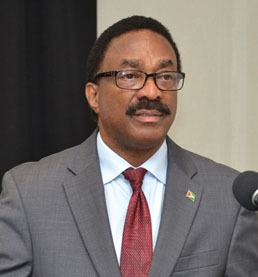Attorney General Basil Williams has “partially appealed” the August 14 ruling by acting Chief Justice Roxane George-Wiltshire which upheld the legality of the House to House (HtH) registration exercise but also declared that existing registrants cannot be excised from a new voters’ list unless they are deceased or otherwise disqualified under Article 159 (2), (3) or (4).
The appeal raises the prospect of another drawn out legal battle and the question of whether the Guyana Elections Commission will proceed on its own.
Williams in his submission has provided 16 points of appeal including the argument that Section 6 of the Registration Act provides for “residency” during the period of a qualifying date as a requirement for registration.
Section 6 (2)(a) of the Act specifies that “it shall be lawful for the commission by order with effect from a specific date to authorize the registration of; all persons in Guyana of the age of 14 years and over; who at said date; are resident in Guyana.”
Accordingly the AG has argued that the Judge erred and was misconceived in law when she found that “there is no law or laws in Guyana which set out additional requirements more particularly residence for purposes of Article 159 (2) ( c ) of the Constitution by failing to properly address her mind to sections 6 of the Act” and further that the Chief Justice failed to properly construe section 6 of the Act in order to find that residency is a requirement of the Act for purposes of Registration during the period of the qualifying date.
Article 159 (2) (c) provides for a person to be qualified to be registered if they are 18 at the qualifying date and “satisfies such other qualifications as may be prescribed by or under any other law”.
Additionally, Williams has argued that the Judge breached the separation of powers doctrine “by purporting to issue instructions to GECOM, a constitutional independent actor to not remove persons who are presently registered from the current National Register of Registrants (NRR) but who are not registered under new House to House Registration from the current NRR.”
The Judge had attached an order to the ruling which underlined that it would be unconstitutional to remove the names of registered persons “unless they are deceased or disqualified pursuant to Article 159(2) with the safeguards for removal of the names of persons pursuant to the National Registration Act, Chapter 19:08 to be strictly complied with.”
The premise of this argument is that Justice George-Wiltshire failed to appreciate that pursuant to Article 159 (5) of the Constitution and Sections 6 and 9 of the National Registration Act, GECOM had embarked on compiling a new NRR which effectively replaces the current one.
Further, the AG contends that it was not proper for the Chief Justice to rule on the issue of persons being removed from the list because it was not an order specifically claimed or sought by the Applicant Christopher Ram.
Concluding that the learned Judge erred in law and/or misdirected herself on the evidence as a whole, Williams has asked that her judgment be set aside, varied and or reversed.










